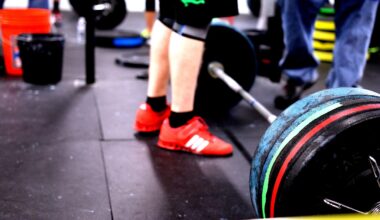Blaming Genetics Instead of Addressing Muscle Building Mistakes
When individuals seek to build muscle, they often encounter various challenges that hinder their progress. A common response to stagnation is to blame genetics for their struggles. While genetics undoubtedly influences aspects of physique and muscle composition, it is essential to recognize that many factors are within one’s control. Each person’s journey in fitness is unique, and attributing lack of progress solely to genetic makeup can mislead and demotivate them. Instead, one should focus on identifying and correcting their training methods, nutrition, and recovery practices, which are crucial for fostering muscle growth. By understanding how overlaps exist between different strategies for muscle building, individuals can take actionable steps on their fitness journeys. For example, considering superior training techniques, nutritional strategies, and recovery practices can help shed light on how to build muscle effectively. Emphasizing one’s actions over genetic factors encourages accountability and adaptability, which ultimately leads to successful results. Instead of resigning to genetic limitations, those aspiring to build muscle should challenge misconceptions and focus on practical solutions that foster lasting progress and satisfaction in their fitness endeavors.
Nutrition plays a vital role in muscle building, and many people overlook its importance while focusing on genetics as a barrier to success. A balanced diet rich in protein, essential vitamins, and minerals helps the body in muscle recovery and growth. Consuming adequate nutrients is not just a suggestion; it is foundational for anyone aiming to boost muscle mass. Protein, specifically, is critical because it provides the building blocks that muscles require to repair and grow after workouts. However, not every individual prioritizes it, often opting for convenience over nutritional value. Those thinking genetics is the main hurdle may not realize the impact of a well-structured meal plan versus random eating habits. In addition to protein, carbohydrates and healthy fats are significant, providing the energy necessary for intense workouts. Focusing on a macro-balanced diet rather than blaming genetic predispositions will enable individuals to fuel their bodies effectively. It is also wise to consult with a nutritionist for personalized advice and adjustments tailored to their unique needs. Developing healthy eating habits strengthens the foundation for muscle growth. Ignoring this aspect can be as detrimental as improperly training the muscle groups themselves.
Common Training Mistakes
Training mistakes are another factor influencing muscle building success. People often blame their genetics for inadequate progress while ignoring their actual workout routines. Poor exercise selection, work volume, and rest times can severely impact the effectiveness of training. For instance, sticking to a limited range of exercises can prevent muscles from receiving comprehensive stimulation necessary for growth. Not varying workout intensity or neglecting compound movements reduces the workout’s effectiveness. Also, many fail to track their progress accurately, making it impossible to understand where improvements can be made. Adopting proper form during exercises is also crucial; poor technique can lead to injuries and prevent muscle engagement. Adequate rest periods are equally important because neglecting recovery can lead to fatigue and diminish performance. Muscle building requires a balance of pushing oneself in the gym while allowing sufficient time for recovery. Therefore, to cultivate gains, focus should be directed toward addressing these training errors rather than succumbing to the notion of genetic limitations. Taking these necessary steps will create a stronger foundation for muscle development and goal achievement.
Moreover, one significant mistake relates to setting unrealistic expectations. Many aspiring muscle-builders assume that they will see massive gains within months, which is often not realistic. Instant results are rarely sustainable, and it is vital to understand that muscle building is a gradual process requiring patience, consistency, and dedication. People tend to compare their journey with fitness influencers or experienced athletes, often forgetting that those individuals have paid their dues through years of hard work. By setting measurable, achievable goals, individuals can build muscle more effectively and experience the satisfaction of progress over time. This positive reinforcement encourages continuous effort and keeps motivation high. Instead of succumbing to frustration and blaming genetics, individuals should celebrate small victories and understand that muscle growth is an evolutionary process. Building muscle successfully requires realistic timelines and understanding that progress can come in numerous forms—strength gains, increased endurance, or even visual muscle definition. Maintaining a long-term perspective will promote discipline in sticking to workout regimes, ensuring consistency leads to meeting and exceeding established fitness goals.
The Role of Recovery
Recovery is an often-overlooked component of muscle building, and not giving this phase the attention it deserves can lead to chronic fatigue and diminished results. People who blame genetics often fail to recognize that their recovery practices may not sufficiently support their muscle growth. Engaging consistently in intense workouts demands time for muscle fibers to repair and grow. Recovery includes quality sleep, hydration, and active or passive recovery days. Without these elements, the body cannot effectively rebuild muscle tissue, posing a challenge for building muscle mass and strength. Overtraining can result in a number of adverse side effects, including plateaued performance or even injury, which keeps aspirants hindered on their journey. Therefore, athletes must emphasize recovery as a critical equal partner in their training regimen. Additionally, adopt strategies such as foam rolling, stretching, and considering rest days to allow the body to rejuvenate fully. Embracing these steps can relieve muscle soreness and improve overall performance. Thus, rather than blaming genetics, recognizing the importance of recovery is essential for achieving substantial and sustainable results in muscle building.
Supplementation can also play a role in overcoming perceived genetic barriers. Many individuals may lean toward blaming their hereditary factors when they experience challenges; instead, they should explore effective supplementation. While supplements do not replace a balanced diet, they can complement it and help distribute essential nutrients effectively to facilitate growth and recovery. Protein powders, creatine, and amino acids can support muscle recovery and enhance performance when used in conjunction with effective training protocols. However, it is crucial to approach supplementation knowledgeably; blindly following trending products without research may not provide ideal outcomes. Individuals should assess their unique needs and consult fitness professionals to create a tailored supplement plan that benefits them. Supplements can serve as a useful asset in muscle-building efforts but must align with overall dietary strategies. Opening discussions about the right supplementation to tackle muscle-building challenges allows individuals to harness a new avenue instead of conceding to genetic limitations. Responsible integration of supplements into one’s regimen can lead to improved outcomes and help dispel the myth that genetics alone dictate muscle-building success.
Conclusion
In conclusion, relying on genetics to explain shortcomings in muscle building can lead to missed opportunities for growth and success. Focusing on various aspects such as nutrition, training, recovery, and supplementation can create a well-rounded approach. By understanding the common mistakes made in muscle building journeys, including neglecting dietary needs, overlooking the importance of recovery, and failing to track progress, individuals can gain valuable insights into ways to optimize results. Moreover, establishing realistic expectations and celebrating small milestones encourage a sense of achievement that collectively builds momentum. By addressing muscle building mistakes with practical steps, individuals are empowered to cultivate sustainable results. Therefore, instead of placing blame on genetic predispositions, the goal should be to actively identify and rectify these elements to achieve progress effectively. Building muscle is challenging, yet incredibly rewarding when approached thoughtfully. Realizing that muscle gain results from adopting the right practices should inspire individuals to take charge of their fitness journey proactively, ensuring that they create the ideal environment for success in muscle building.


